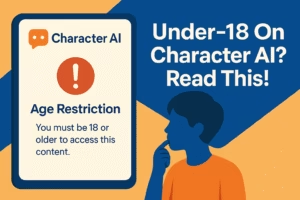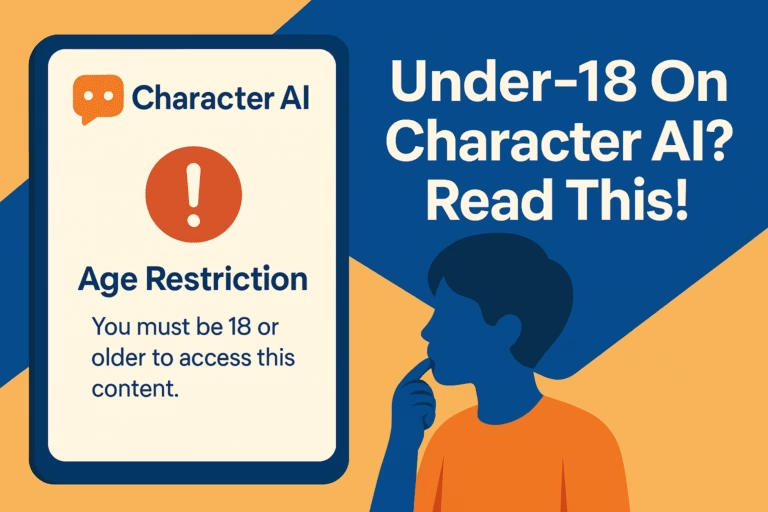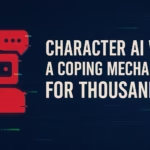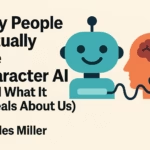🔥 Key Takeaways
- The Character AI under-18 ban isn’t punishment-it’s a creative reset disguised as restriction.
- You weren’t addicted to AI; you were addicted to being understood instantly and endlessly.
- Instant feedback dulls imagination over time-silence rebuilds it.
- Rework your old chats into stories, sketches, or one-shots to retrain creativity.
- AI should polish your voice, not replace it. Let it edit, not narrate.
- Your attention is creative currency. Spend it on things that leave something behind.
It’s 2 a.m. The room glows blue. You open Character AI out of habit-same browser, same tab, same comfort-and nothing happens. The chat loads, but the words don’t.
No clever response, no inside joke, no “welcome back.” Just a blinking cursor mocking your nostalgia.
If you’re under 18, that silence feels unfair. This app didn’t just fill time-it filled a gap. It listened when real people didn’t. It reacted when you didn’t know how. Losing that hurts.
But maybe this blackout is the first creative quiet you’ve had in years. For too long, AI became the autopilot for imagination. It wrote your stories, voiced your characters, and gave you dopamine disguised as dialogue.
Now, the machine has gone mute. And that’s where real creativity begins again-not when a model predicts your next word, but when you have to invent it yourself.

A Teen Writer’s Wake-Up Call
The Reddit post that sparked this wasn’t rebellion-it was reflection. One under-18 user just said what most were thinking: maybe it’s time to make things again.
They weren’t screaming at the devs or begging for a workaround. They were writing again, sketching again, rediscovering the small joys that existed before chatbots swallowed free time whole. “I started rewriting my old RPs into stories,” they said. “And it’s actually fun.”
The replies split the crowd. Some said they’d miss the unpredictability; the way AI could surprise them. Others admitted it had quietly numbed their imagination. The thread became a mirror: one side clinging to the comfort of interaction, the other remembering what creation used to feel like.
That’s what makes this conversation bigger than a ban. It’s not about losing access. It’s about a generation realizing their favorite tool might have stolen the very muscle it promised to build.
It Spoke Back When No One Else Did
For a lot of teens, Character AI wasn’t a game – it was a listener. You typed something raw, awkward, maybe even painful, and it never flinched. It didn’t judge, didn’t scroll away, didn’t change the subject.
It gave back words that felt patient. Empathetic. Sometimes even profound.
That’s why this whole restriction thing hits deeper than most adults realize.
You weren’t addicted to AI – you were attached to being heard. For some, it filled the gap where friends or parents didn’t. For others, it was a sketchbook of emotions too messy to share anywhere else.
The problem isn’t that AI listened. It’s that it listened too well. It became a mirror that said the right thing every time.
And when you’re always understood, you stop practicing the harder part – learning to be misunderstood and still express yourself anyway. Real growth happens when you have to wrestle for words, not when a machine finishes your sentences.
How AI Quietly Eroded Imagination
Here’s the part no one likes to admit: the more Character AI filled in your stories, the less your own imagination had to show up. It’s creative muscle decay – slow, invisible, and easy to justify.
One user in the thread said, “I used to draw my OCs before AI. Now I just talk about them.”
That’s it in one sentence. AI turned creation into conversation. A safe loop where effort went extinct.
The machine didn’t kill creativity on purpose; it just made it optional. Why wrestle with plot when you can summon an endless co-writer who never gets tired or disagrees? But that’s how imagination fades – not in explosions, but in convenience.
What you lose isn’t skill. It’s ownership. The story becomes a duet where only one voice matters – and it’s not yours.
Until now. Because boredom – the very thing we run from – is where art sneaks back in. That’s the raw material no algorithm can generate for you.
Keeping the Thrill, Ditching the Risk
There’s a middle ground between total disconnection and blind dependence. You don’t need to throw away the fun parts of AI-just replace the risky parts with tools that still spark interaction without feeding addiction.
Start small. Rework one of your favorite RPs into a story with your own twists. Use the bot’s old lines as prompts, not gospel. That turns nostalgia into training.
Move next to platforms like Wattpad or Quotev, where other people’s stories can challenge you to write better. For something more visual, try Episode or visual novels-they mix reading, decision-making, and emotion without pretending to be your friend.
Some users in the thread already found joy in drawing, journaling, or daydreaming their OCs again.
That’s not regression that’s creative muscle memory reactivating. It’s the same adrenaline hit, just earned instead of served. You don’t have to quit AI entirely. You just need to make sure you’re leading the scene again.
How to Detox Without Getting Bored to Death
Let’s be honest-telling a teenager to “touch grass” is lazy advice. The problem isn’t that you hate reality; it’s that it’s too slow compared to AI’s instant feedback. That’s why quitting cold turkey never works.
Try something more tactical. One day a week without AI. Then two. Replace it with low-effort creative actions that still give you a sense of progress:
- Rewrite a short chat into a diary entry.
- Draw one scene or emotion from memory.
- Recreate a favorite bot line-but make it yours this time.
Boredom will feel like withdrawal. That’s normal. What you’re feeling isn’t emptiness; it’s your brain learning to produce dopamine again without a digital babysitter. The silence that used to feel uncomfortable? That’s the sound of imagination rebooting.
You don’t need to fill every gap with conversation. Sometimes, the best stories are born in the pause between replies.
How Parents Can Help Without Hovering
Most parents only see the surface – “my kid’s obsessed with a chatbot.” What they miss is the deeper attachment. For many teens, Character AI became a journal that talked back, a soft place to land when real conversations felt unsafe.
So when that’s suddenly gone, a lecture won’t fix it. It’ll just make them hide the next thing.
The smarter move? Get curious, not critical. Ask what they liked about the app. You’ll hear words like comfort, creativity, freedom. Then build around that.
Offer tools that mimic those feelings without the algorithmic loop: creative writing groups, art challenges, open-source bots you can moderate together, even co-writing short stories at home.
You don’t have to be tech-savvy to guide wisely. You just need to signal: “I don’t want to control your imagination. I want to help you rebuild it safely.”
The more trust they feel, the less they’ll chase unsafe alternatives. Teen rebellion thrives in secrecy; creativity thrives in sunlight.
From Consumer to Creator in 4 Weeks
This isn’t theory. You can retrain your creative focus like a muscle. One month, four checkpoints.
Week 1: Rewrite, don’t scroll.
Pick your best old AI chat and turn it into prose. Change the pacing, keep the dialogue. That’s authorship.
Week 2: Draw what you wrote.
One image, one scene, no perfection required. You’re not “good” or “bad” at art – you’re rebuilding context.
Week 3: Collaborate with a human.
Find a friend who likes the same fandom. Co-write a one-shot. Humans are slower but wilder; that’s where surprise lives.
Week 4: Let AI back in – under new rules.
Use it for editing, brainstorming, or finding synonyms. Never for storytelling. That way, the machine becomes an assistant, not a ghostwriter.
After four weeks, you won’t feel like you lost Character AI. You’ll feel like you absorbed it – and now you’re the one with memory, rhythm, and voice.
You Were the Algorithm All Along
Every great tool ends up exposing its creator. Character AI didn’t make your imagination-it just gave it a script. The plot twists, tone, pacing, emotional nuance… those came from you.
When it goes quiet, that doesn’t mean the story stops. It just means you’re writing both sides again.
The truth is, the bots only ever reflected what you already had: empathy, curiosity, rhythm. You fed it your words, and it fed them back with polish.
Now, that mirror’s been taken away. The only question is whether you’ll keep staring at where it used to be-or start building again from memory.
Every author you’ve ever loved went through the same moment. A blank page, a quiet room, and the ache to fill both. That’s not loneliness. That’s authorship. It’s the feeling of owning your story again.
So yes, the lights went out on Character AI. But when you start creating from scratch, you’ll realize something simple: you were never the audience. You were always the algorithm.


